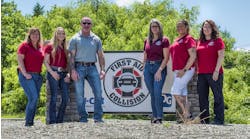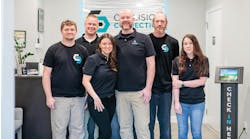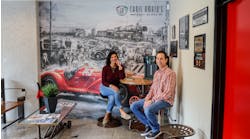Merging two family-owned MSOs, Legacy Autobody builds foundation for future growth
There is strength in numbers, which is why many shop owners have considered either expanding their business to become an MSO, or looked at partnering with a franchise brands or a consolidator. Pennsylvania’s Legacy Autobody Group is the result of two family-owned MSOs teaming up under the CARSTAR brand, and creating a strong, competitive business.
Both Scott’s Collision Centers and Duncan Autobody were well-known in Eastern Pennsylvania. The shops had a lot in common – both companies were launched in the early 1970s, both had two locations, and both were family-owned, with second-generation leaders in place in the 2000s.
|
At a Glance: Legacy Autobody |
|
Easton, Pa. Headquarters |
|
6 No. of locations |
|
80 No. of employees |
|
1 Markets served |
|
Spies Hecker Paint supplier |
|
$18 million Revenue |
| legacyautobody.com |
According to Matt Dewalt, Legacy’s co-owner and former president of Scott’s, the two companies had been friendly competitors for years. In 2017, Dewalt and Duncan’s owners (Mike and Eric Horvath) decided that they would be stronger if they merged.
“We’d have more buying power, and we’d be able to leverage better vendor discounts,” Dewalt says. “We also liked the concept of working together – they know things that I don’t know, and there are things I know that I could teach them. It’s nice to have somebody onboard that has your back. And having four shops would give us more marketing power and help us compete against the bigger shops.”
Local competition includes Gerber, Caliber Collision, and two large dealership groups with autobody operations. Dewalt and the Horvaths decided they would need some stronger DRP relationships to stay competitive (neither group had many DRP agreements in place), and opted to partner with CARSTAR in order to take advantage of the company’s national insurer agreements.
Managing the merger
The employees at the existing locations welcomed the merger. “We explained why we were doing this, and they were all excited,” Dewalt says. “We explained that healthcare costs were rising, competition was increasing, and we didn’t want to keep asking them to pay more or do more. We could save money and grow the company.”
Dewalt says the biggest challenge of merging the companies together was adjusting to the co-ownership arrangement. “You’re working with people every day that you weren’t working with before,” Dewalt says. “Originally we talked to a lot of consultants to do business evaluations on how to split the ownership, but ultimately we just decided to come to a number on our own.”
Legacy has standardized forms and other materials, and all of the shops are using the CCC software platform. The company also engaged a management company to help streamline processes across the company. “It’s a two-year program, and they come in and observe the processes at all locations,” Dewalt says. “They pick the best processes, and build a playbook for us. We’re half way through that program, and are teaching those processes to all of our staff.”
Shop managers at each location handle day-to-day operations, while two bookkeepers handle the financials. All paint supplies come from the same jobber, and most of the parts vendors are consistent across locations. Shop managers handle insurance issues and serve as points of contact. “If something needs escalated, the that comes to us [the owners],” Dewalt says.
“We also just promoted a location manager to operations director, so he is going to start working with the shop managers and overseeing the locations,” Dewalt says. “That will help the three of us, as owners, concentrate on finances and growing the business.”
Poised for growth
As a four-shop company, Legacy was also better positioned to expand in the region. “Part of the merger was that we had a mindset to grow,” Dewalt says. “We started contacting local shops, and CARSTAR was contacting shops as well.”
Legacy was able to purchase an existing shop to bring the group to five locations, and as of this writing is about to open a sixth shop that was a brownfield development. Being a larger MSO helped Legacy obtain financing from a local bank, Dewalt says.
“We’ve identified markets we want to be in, and if we can’t work a deal, then a brownfield seems like an option we’d consider again down the road,” Dewalt says. “We look at the existing shops on a map, and if we see a hole in coverage we see if we can fill it.” Legacy also gets feedback from insurance partners on potential opportunities.
The company also looks for shops of a certain size to fit its business model. “There are a lot of small shops, but we can’t afford to operate them,” Dewalt says. “We have a manager model, and if you have a 4,000-square-foot shop and have to pay a manager salary, there’s no way to get enough revenue to support that.”
Legacy’s current shops range from 8,000 square feet to 21,000 square feet.
The shop Legacy acquired was another family-owned business, and Dewalt says that the original owner’s children still work there. Legacy simply brought in their own manager and retained the rest of the staff. “It was a nice shop, but they hadn’t invested a lot in training or equipment in the past few years,” Dewalt says. “We brought in a new Car-O-Liner frame machine and added vacuum sanding. We gave the employees a good benefits package and vacation. They’ve been excited, and they’re looking forward to seeing growth and having new equipment and training.”
As a four-shop operation, Legacy did $13.5 million in business last year, and Dewalt estimates that with six shops the company will reach $18 million in revenue. “When we started, we had a plan to build the company to $20 million in sales, and we’re already getting close, so there’s really not a limit at this point. If we can keep adding one or two shops per year, we will keep expanding.”
To staff the other new shop, Legacy is moving a manager to the brownfield development and promoting an estimator to manager at his previous location. “We’ve started training ahead of time,” Dewalt says. “One of our shops has two painters and no preppers, so we’re sending a painter to the new location and hiring preppers for both shops. We always have issues finding technicians.”
While there is no formal promotion track yet, Dewalt says that being an MSO has opened opportunities for employees to move up in the organization. “We also just started an apprenticeship program that we’re piloting for body technicians,” Dewalt says. “That’s the hardest position to fill, because young people just aren’t getting into the industry anymore. We’re looking for people with a willingness to come and work every day and learn the craft. We’ll hire the attitude and teach the skill.”
Like other shops, Legacy does struggle to locate new technicians, a problem that will likely increase as the company expands. “We have some schools nearby, but we don’t get many people out of them,” Dewalt says. “There’s one tech school in our area, and they just have one person in their autobody program. I expect that program will not exist within the year. Finding body technicians and estimators is one of our biggest challenges. We call them ‘ghosts.’”
Dewalt says the CARSTAR relationship has paid off in terms of sales and other benefits. “There are rebate programs we take advantage of,” Dewalt says. “There are some challenges, too. There’s a central review program, so we’ve had to integrate that into our estimating process, but overall it’s been positive.”
Becoming a larger MSO has helped Legacy gain new business, reduce costs, and opened up new opportunities for revenue growth. Dewalt also says that the merger has made being an owner much less grueling. “I have more freedom,” he says. “I can go away for a week and not have to worry. “There are two other owners, and we have a lot of good managers in place.”





